Ambassador Jeff Flake: America ‘needs friendships,’ and so do our allies
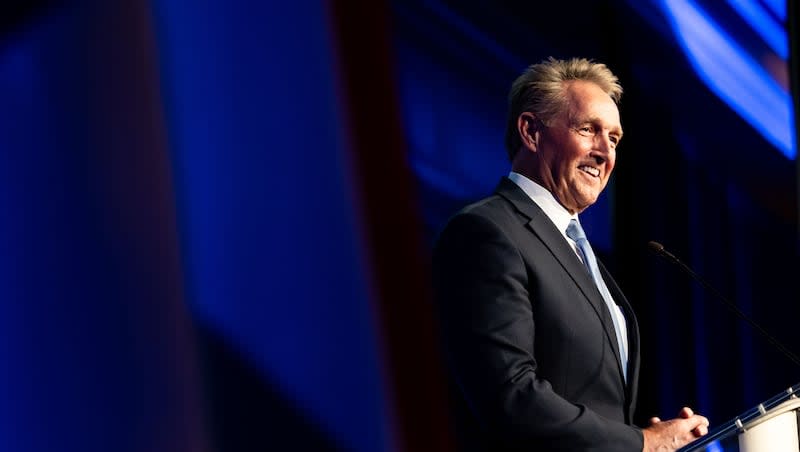
The Daily Beast’s 2022 headline — “Jeff Flake Got More Than He Bargained For” — becomes more accurate by the day. The ex-senator from Arizona assumed the U.S. ambassadorship to Turkey a month before Russia invaded Ukraine, just across the Black Sea from Turkey. Then, a year-and-a-half later, war broke out to the south, when Hamas attacked Israel.
When reminded of the headline during an interview Thursday, Flake smiled. “Napoleon said, ‘If the world was a country, Istanbul would be its capital,’” he said. That’s especially true when “the world is in upheaval.”
Turkey borders Syria, Iraq, Iran, Armenia and Georgia. It shares the Black Sea with Ukraine and Russia. As a Muslim-majority country, its population is sympathetic to Palestine. “There’s a lot going on,” Flake said.
“When the White House asked if I’d consider something, I said, ‘Only if it’s consequential,’” Flake said. He laughed. “We overshot the mark.”
Flake visited Salt Lake City on Thursday to speak at the Crossroads of the World International Trade Summit, hosted by Zions Bank and World Trade Center Utah. During his remarks, he discussed Turkey’s efforts to bolster Ukraine in its fight against Russia.
He also spoke about the devastating earthquake that rocked Turkey a year ago. He mentioned that The Church of Jesus Christ of Latter-day Saints has donated over $40 million in aid, “the largest contribution by a single organization, by far.”
“No state in the country has been more charitable than Utah,” Flake said, to applause. “Not even close.”
Before his speech, Flake spoke with the Deseret News about Ukraine, bipartisanship in the Senate and the 2024 U.S. presidential election.
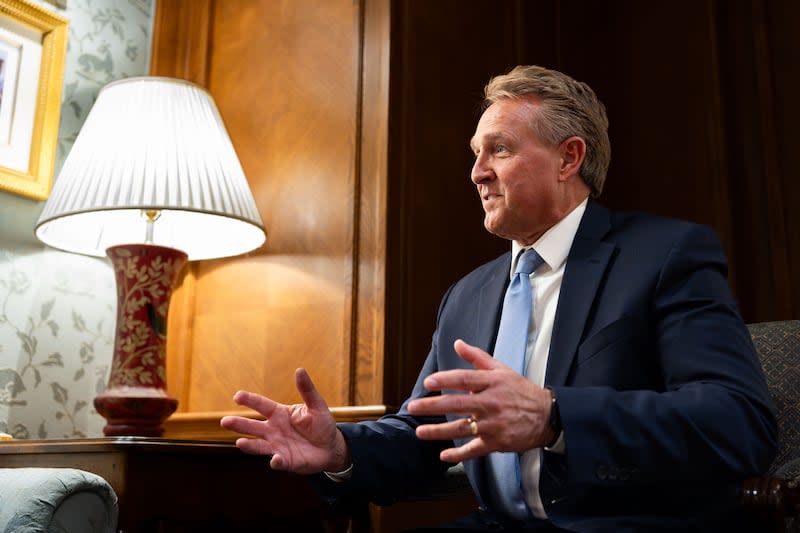
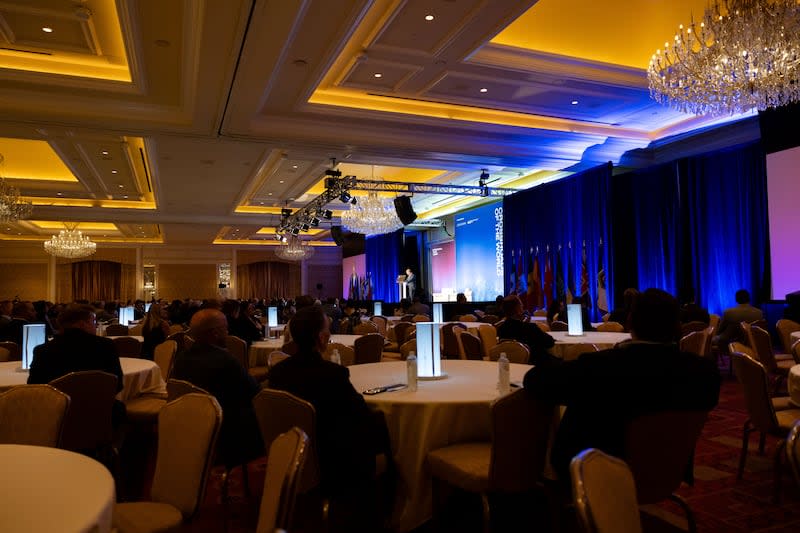
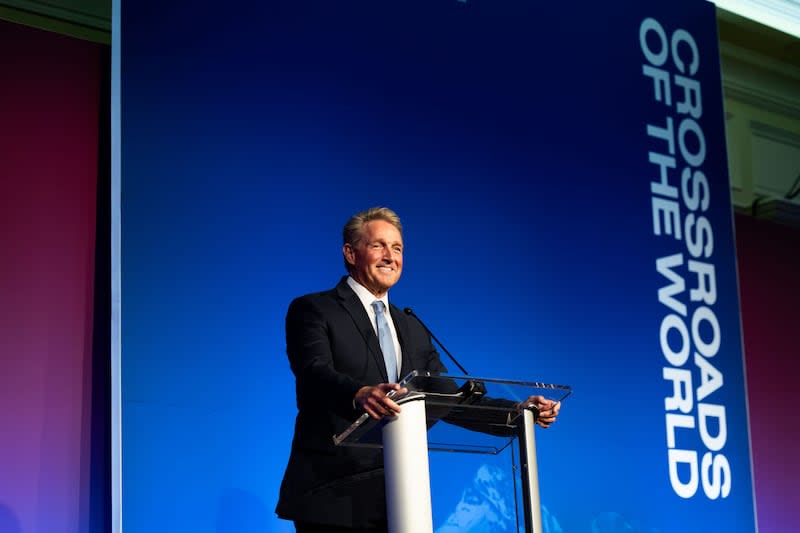
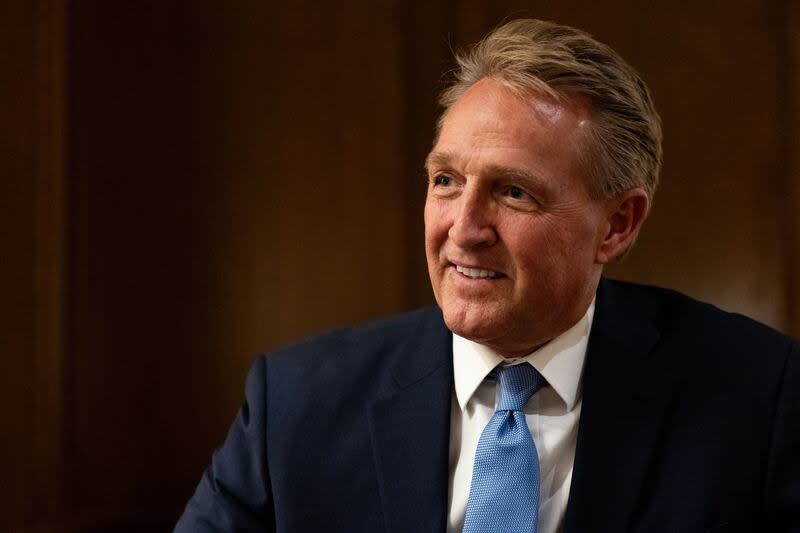
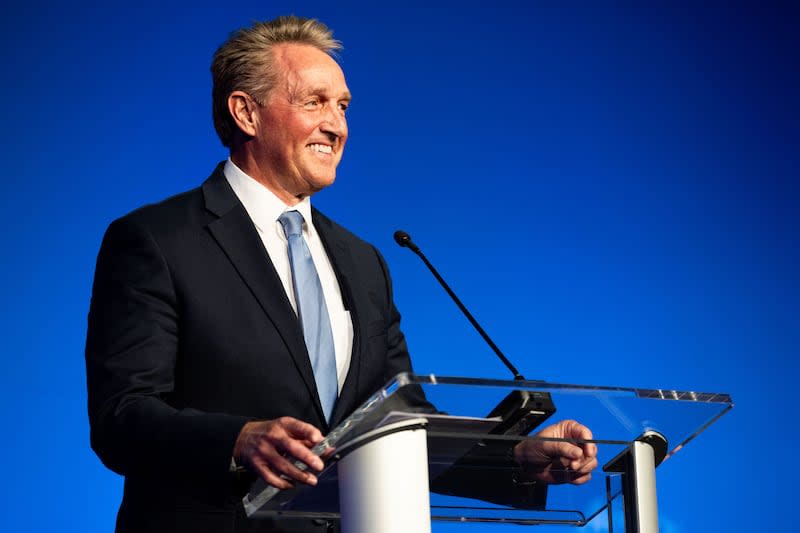
Flake used the pronunciation Türkiye during the interview, as it is used in diplomatic contexts. The conversation has been edited for length and clarity.
Samuel Benson: Congress passed an aid package last month to help arm Ukraine, but not without opposition. I’m curious about your thoughts on that negotiation.
Ambassador Jeff Flake: I was so, so happy. I happened to be in Washington in March on Capitol Hill with all of my former colleagues and getting their assessments, whether it was going to go or not. I’m sure glad it did. It was a great example of the House and the Senate acting like the House and Senate of old, where you’d cross party lines, form coalitions and vote for something good.
I’ll tell you, it meant a lot to us out there, because obviously we’re trying to make sure that Türkiye is engaged. They have been steadfast in their support for Ukraine’s sovereignty. They invoked the Montreux Convention. They supplied, commercially, drones that have helped immensely. They’ve helped us with sanctions that we’ve imposed on Russia. So for us to then say, “we’re not going to fund this anymore,” it would be very difficult to explain to our host government there.
SB: Do you miss being in the Senate?
JF: Yes. You miss the associations. There are good people there. Some things you don’t miss — the fundraising I don’t miss. I don’t miss speaking to a large group here today, in a nice hotel, and not asking for money afterwards.
SB: The Senate has certainly changed dramatically since you left in 2019. You mentioned the “Senate of old,” where there is bipartisanship and cooperation. A lot of the dealmakers — Manchin, Sinema, Romney — are leaving. What do you make of the future of the Senate?
JF: It’s difficult. All that institutional memory about how legislation was passed — it’s gone. So, I mean, people will rise up, but it’s more difficult. The incentives are far more difficult, far more aligned with pushing people to the extremes, and so that makes legislating really difficult.
SB: The Senate, in recent months, has been deliberating over immigration, as well. For a time, foreign aid was tethered to immigration. That package failed. What do you think of tying border security to aid for Ukraine?
JF: Well, that’s part of politics. Whether it was wise to tie them — I didn’t think anything that slowed up Ukraine aid should have been employed. There are some things that are just so important that they have to move quickly. But obviously, as one who has been involved in immigration reform for all 18 years I was in Congress, it’s important, and I hope that they can reach a solution.
SB: You’ve said that because Türkiye is a Muslim-majority country, sympathies lie with Palestine. What role does Türkiye play in potentially negotiating peace in the Middle East?
JF: Well, Türkiye has been a longtime supporter, as we have, of a two state solution, and they’ve continued to push that. They have talked about some kind of guarantor role afterwards. Obviously, there would be a guarantor for the Palestinians, and assuming that the U.S. would be guarantor for Israel somehow. And other regional powers would assume some kind of role there. That’s not really fleshed out much. But we’re going to need something the day after.
I can’t see a future peace without some of the regional powers like Türkiye playing some role. Obviously, they’ll have a big role in the rebuilding. In Ukraine and in Gaza, they’ll be certainly involved in that.
But yes, their sympathies certainly are with the Palestinians, and this is a tough issue for us to deal with. But, you know, we try to be good at compartmentalizing certain things that we disagree on, whether it’s northeast Syria, the (Syrian Defense Forces) or whatever — we agree to put those things on the shelf and deal with the number of issues that we agree on.
SB: Do you mean compartmentalizing between your views and Türkiye’s, or the United States’ and Türkiye’s?
JF: The United States’ position versus Türkiye’s.
SB: What do you view Türkiye’s role to be within NATO?
JF: Oh, obviously, they’re a significant, substantial part of NATO. They have the second largest army and NATO’s second largest air force. They protect the southeastern flank. They have joined us in missions in Afghanistan. Right now there’s Turkish troops in Kosovo on a NATO mission. So they’re always eager to uphold their responsibilities there.
With Ukraine, a lot of what they’ve done, people don’t know. Invoking the Montreux Convention to keep Russian warships out of the Black Sea. So these things have been important.
If you poll Turks on their attitude toward the United States, that’s somewhat humbling. But if you asked Turks, do you think that Türkiye should remain a member of NATO, you get into 70s (percent) in support. People see that as an important thing, to side with the West. They certainly see themselves more anchored in the West than aligned with Russia.
SB: What do you perceive Americans’ view of Türkiye to be, especially as it relates to Ukraine, and does that match your view?
JF: It’s difficult. You see the headlines. When they do something that aids Ukraine, that doesn’t get as much press as when people find out that they haven’t imposed the same sanctions on Russia that we have. They have said that they will not allow Türkiye to be used to circumvent sanctions. But obviously, they have an economic dependence — particularly on the energy side — on Russia, and tourism. The bulk of their natural gas oil comes from Russia, like much of Europe. We can’t expect them to simply go cold turkey, if you will.
But we’ve worked with them — and we’re getting better results working with them — to try to block dual use items from being imported into Türkiye and then transshipped to Russia. And they’ve been increasingly cooperative.
SB: I want to ask about your view of America’s role abroad, and especially in eastern Europe. How has your time in Türkiye influenced your perspective on what the U.S.’ role globally should be?
JF: Well, I think the timing of going there, with Russia invading Ukraine for the second time, that has really done more to shape — I mean, I’ve always been an internationalist. I believe that the the world is better off if we play a substantial role, and we lead with our military and with our values. So I think it’s important to stick with Ukraine now, and that we continue.
What’s been heartening to see is Sweden and Finland, for example, coming into NATO and making that alliance stronger. But Russia is a tough foe. They can outlast a lot of people. When you have a dictator at the helm, they’re impervious to political pressure from below. That’s a dangerous thing. So we have to remain cognizant of that and we have to remain engaged. And that means not just on the security side, but on the trade side as well.
SB: Are people in Türkiye paying attention to the U.S. presidential election?
JF: Yes.
SB: How does that affect the situation with Ukraine?
JF: I think they realize, despite what rhetoric you hear during the campaign, that the U.S. stands with Ukraine. So I mean, obviously we look at the nuances. But it’s not as if, when I meet with the foreign minister, he says, “Well, we’re going to wait to see what happens in the election.” They’re engaging now. So that’s important to us.
SB: Do you have any concern what a second Donald Trump term would look like for American foreign policy, specifically as it relates to Ukraine?
JF: I can’t answer that question given my position. I have my own views, but I can’t share them.
SB: The International Criminal Court this week sent out an arrest warrant for Netanyahu and for leaders of Hamas. What do you make of that?
JF: That’s a false equivalence, to put the two together. It doesn’t make sense to me.
SB: Do you still consider yourself to be a Republican?
JF: I do.
SB: Are you still registered to vote in Utah?
JF: Yes.
SB: Do you plan to vote in the presidential election?
JF: Of course. You can’t ask for whom.
SB: I don’t know if you watch “The View,” but Christine Blasey Ford was on this week, and she said you were one of two Republican senators who treated her kindly during the Brett Kavanaugh hearings. Did you see that, and what was your response to it?
JF: I read about it. I think everyone deserves to be treated kindly. What a difficult thing for her to do. So I thought it was the right thing to do, and still do.
SB: Are we lacking kindness in politics?
JF: Certainly. That’s becoming less and less common, that people can compartmentalize and say, “We didn’t agree on this, but we agree on other things.” A lot of it has to do with how easy it is to go on social media and tweet without thinking. It’s just kind of a toxic brew right now that gives us what we have. I hope we can return to some semblance of normalcy, if that’s still a possibility.
SB: The last thing I’ll ask you: In election years, we tend to get a bit myopic, focused on what’s happening in the U.S. If you could tell Americans to pay attention to one thing in the world right now, what would it be?
JF: Well, I think there’s a strain of politics — I think a malignant strain — right now that says, we can shut the world out, and that we can be more peaceful, more secure, more prosperous, by shutting the world out. And I think that is wrong.
We need alliances. We need friendships. And that’s one thing that I’ve always known. It’s certainly been reinforced, particularly after Ukraine. You need friends, you need allies. And you can’t say, “Well, we disagree on this issue, and so we won’t do anything together.” You’ve got to have allies. You’ve got to have friends. I know that doesn’t play well in domestic politics, but it should.
I have to say, when I go to Capitol Hill on issues that are facing either Türkiye or the region, and I talk to my former colleagues — I mean, whether I’m talking to (Sens.) Jim Risch, R-Idaho, or Ben Cardin, D-Md., or (Reps.) Greg Meeks, D-N.Y., or Michael McCaul, R-Texas, there is not much difference. Politics doesn’t completely stop at the water’s edge, but that’s more true than not, and that’s helpful. If you see voting patterns on this issue, it’s different than domestic politics. That’s good, in my view.

